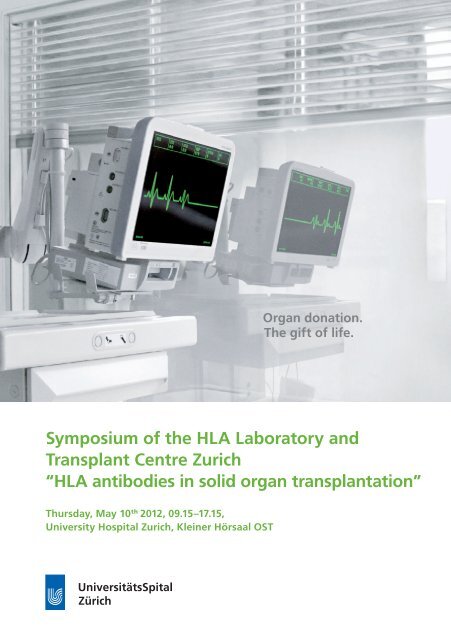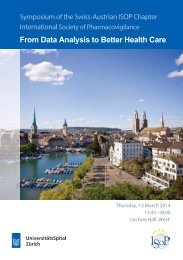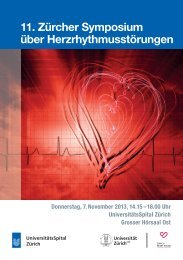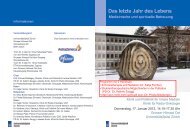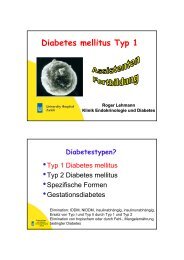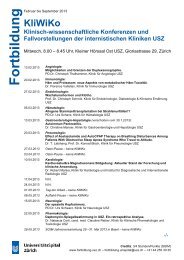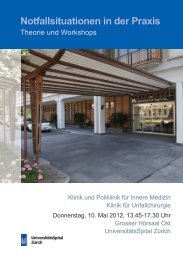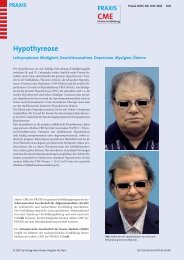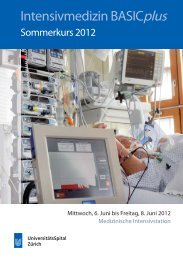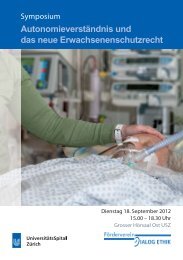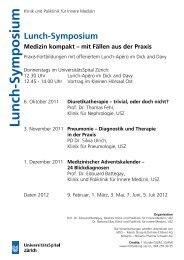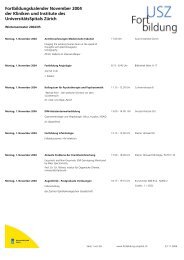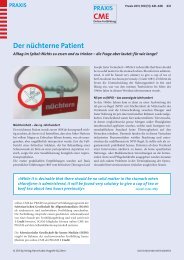HLA antibodies in solid organ transplantation - Fortbildung
HLA antibodies in solid organ transplantation - Fortbildung
HLA antibodies in solid organ transplantation - Fortbildung
You also want an ePaper? Increase the reach of your titles
YUMPU automatically turns print PDFs into web optimized ePapers that Google loves.
Symposium of the <strong>HLA</strong> Laboratory and<br />
Transplant Centre Zurich<br />
“<strong>HLA</strong> <strong>antibodies</strong> <strong>in</strong> <strong>solid</strong> <strong>organ</strong> <strong>transplantation</strong>”<br />
Thursday, May 10 th 2012, 09.15–17.15,<br />
University Hospital Zurich, Kle<strong>in</strong>er Hörsaal OST<br />
Organ donation.<br />
The gift of life.
Dear Colleagues,<br />
In recent years re-<strong>transplantation</strong> has become common practice <strong>in</strong> <strong>solid</strong> <strong>organ</strong> <strong>transplantation</strong><br />
not only for kidney, but also for liver, lung, pancreas, <strong>in</strong>test<strong>in</strong>e and heart<br />
recipients. Therefore, <strong>HLA</strong> sensitization has become an <strong>in</strong>creas<strong>in</strong>g problem <strong>in</strong> the field<br />
of <strong>solid</strong> <strong>organ</strong> <strong>transplantation</strong>. The advent of novel <strong>solid</strong> phase assays allows precise<br />
determ<strong>in</strong>ation of the specificity and strength of a given antibody. This <strong>in</strong> turn has led to<br />
a number of studies on pre- and post-transplant risk assessment <strong>in</strong> <strong>solid</strong> <strong>organ</strong> recipients<br />
provid<strong>in</strong>g guidance for immunosuppressive management.<br />
In the first part of this symposium, we will discuss the role of <strong>HLA</strong>-C, -DP and MICA<br />
<strong>in</strong> <strong>solid</strong> <strong>organ</strong> <strong>transplantation</strong> and thereafter, address which <strong>antibodies</strong> and which MFI<br />
levels are relevant for cl<strong>in</strong>icians. Technical problems such as the impact of the prozone<br />
effect and novel assays such as C1q b<strong>in</strong>d<strong>in</strong>g will be highlighted. Dur<strong>in</strong>g the afternoon,<br />
we will focus on <strong>HLA</strong> antibody test<strong>in</strong>g <strong>in</strong> kidney, pancreas, heart and multi-visceral<br />
<strong>transplantation</strong>.<br />
Once aga<strong>in</strong>, this year will be another important one for the Zurich <strong>HLA</strong> Laboratory.<br />
In 2011 we were able to move the lab <strong>in</strong>to a totally refurbished sett<strong>in</strong>g. The new rooms<br />
fulfil all technical criteria for EFI accreditation, which we applied for <strong>in</strong> 2012. We are<br />
confident that this symposium will highlight these important advancements. We are<br />
look<strong>in</strong>g forward to welcome you as our guest on May 10 th <strong>in</strong> Zurich.<br />
With k<strong>in</strong>d regards,<br />
Thomas Fehr Urs Schanz Jens Brockmann Barbara Rüsi<br />
Part I – Technical aspects of <strong>HLA</strong> antibody test<strong>in</strong>g<br />
Chair: Jean-Marie Tiercy, Geneva<br />
09.15–09.55 <strong>HLA</strong>-C, -DP and MICA <strong>in</strong> <strong>organ</strong> <strong>transplantation</strong><br />
Joannis Mytil<strong>in</strong>eos, Ulm<br />
09.55–10.35 The prozone effect <strong>in</strong> <strong>HLA</strong> antibody test<strong>in</strong>g<br />
and other <strong>in</strong>terference factors<br />
Nils Lachmann, Berl<strong>in</strong><br />
10.35–11.00 Coffee break (Dick&Davy)<br />
11.00–11.45 What determ<strong>in</strong>es pathogenicity of an <strong>HLA</strong> antibody:<br />
MFI? C1q b<strong>in</strong>d<strong>in</strong>g? Aff<strong>in</strong>ity?<br />
Peter Brescia, Los Angeles<br />
11.45–12.15 EFI accreditation: critical issues<br />
Jean-Marie Tiercy, Geneva<br />
12.15–13.30 Lunch (Dick&Davy)<br />
(In parallel: <strong>HLA</strong> Lab visit for <strong>in</strong>terested participants)<br />
Part II – Cl<strong>in</strong>ical implications of <strong>HLA</strong> antibody test<strong>in</strong>g<br />
<strong>HLA</strong> <strong>antibodies</strong> <strong>in</strong> kidney <strong>transplantation</strong><br />
Chair: Thomas Fehr, Zurich<br />
13.30–14.00 Pre-transplant risk assessment for kidney allocation:<br />
the Swiss cPRA project<br />
Jean Villard, Geneva<br />
14.00–14.30 Is there a role for <strong>HLA</strong> antibody monitor<strong>in</strong>g<br />
post kidney <strong>transplantation</strong>?<br />
Stefan Schaub, Basel<br />
<strong>HLA</strong> <strong>antibodies</strong> <strong>in</strong> other <strong>solid</strong> <strong>organ</strong> transplants<br />
Chair: Jens Brockmann, Zurich<br />
14.30–15.00 Heart <strong>transplantation</strong><br />
Thomas Fehr, Zurich<br />
15.00–15.30 Coffee break (Dick&Davy)<br />
15.30–16.00 Liver <strong>transplantation</strong><br />
Philipp Dutkowski, Zurich<br />
16.00–16.30 Pancreas/islet <strong>transplantation</strong><br />
Diego Cantarovich, Nantes<br />
16.30–17.00 Small bowel/multivisceral <strong>transplantation</strong><br />
Andreas Pascher, Berl<strong>in</strong><br />
17.00–17.15 Clos<strong>in</strong>g remarks<br />
Thomas Fehr, Zurich<br />
17.15 Apéro
Speakers and Chairmen<br />
Peter Brescia<br />
International Division Manager One Lambda<br />
Canoga Park CA<br />
PD Dr. Jens Brockmann<br />
Division of Visceral and Transplant Surgery<br />
University Hospital Zurich<br />
Prof. Dr. Diego Cantarovich<br />
Division of Transplantation<br />
University Hospital Nantes<br />
Prof. Philipp Dutkowski<br />
Division of Visceral and Transplant Surgery<br />
University Hospital Zurich<br />
Prof. Thomas Fehr<br />
Transplantat Centre Zurich<br />
Division of Nephrology<br />
University Hospital Zurich<br />
Nils Lachmann<br />
Scientific advisor BmT GmbH<br />
Meerbusch-Osterath<br />
PD Dr. Joannis Mytil<strong>in</strong>eos<br />
Division for Cl<strong>in</strong>ical Transfusion Medic<strong>in</strong>e<br />
and Immunogenetics<br />
University Hospital Ulm<br />
PD Dr. Andreas Pascher<br />
Division of Visceral and Transplant Surgery<br />
Charité – University Hospital Berl<strong>in</strong><br />
PD Dr. Stefan Schaub<br />
Division of Transplant Immunology<br />
and Nephrology<br />
University Hospital Basel<br />
PD Dr. Jean-Marie Tiercy<br />
National Histocompatibility Reference<br />
Laboratory<br />
University Hospital Geneva<br />
PD Dr. Jean Villard<br />
Immunology and Transplantation Unit<br />
University Hospital Geneva<br />
Credits: requested by SGN, SGIM, SGC,<br />
SGH and SGA<br />
Location<br />
University Hospital Zurich<br />
Kle<strong>in</strong>er Hörsaal OST B<br />
(Please note the signpost<strong>in</strong>g)<br />
Sponsors<br />
BmT GmbH Laborprodukte<br />
Novartis Pharma Schweiz AG<br />
Roche Pharma (Schweiz) AG<br />
Organization<br />
University Hospital Zurich<br />
Transplant Centre<br />
cc Kathr<strong>in</strong> Kocher<br />
Raemistrasse 100<br />
8091 Zurich<br />
Tel.: +41(0)44 255 10 87<br />
email: kathr<strong>in</strong>.kocher@usz.ch


